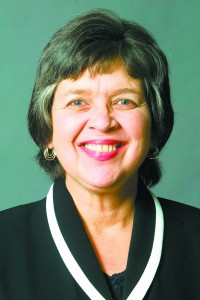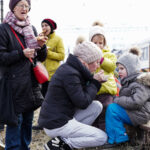By Janet Richards
A sauerbraten roast simmers on the stove and the pungent smell of red cabbage and spatzel permeates the air. My Austrian grandma, Mitzel, is up to her elbows in cucumbers and sour cream as she churns the mixture with her hands in a shallow plastic bowl. Her stocky frame fits a child-sized chair at the kitchen table. Her puffy feet are crammed into chunky heeled black shoes, and the vest- like apron she always wears is soiled and worn. Her false teeth click as she moves her mouth with satisfaction. She is in her element.
The kitchen sink overflows with soiled dishes and the rest of the house is as unkempt as Mitzel’s sparse hair, which falls in long strings on her forehead as she cooks. Her eyes twinkle and she seems barely able to contain her joy as I bring a spoon of her pickled fish to my lips. The food is silken perfection –glorious, and I know that she lives to create it. It doesn’t disappoint.
As a child I could always find my Grandmother. She sat like a garden gnome, perched in the same pale green wooden chair at a Formica table in her tiny kitchen in Queens, New York. I picture her there, dicing celery, peeling parsnips and rutabagas, listening to Mitch Miller on the hi-fi, and swigging Budweiser from an amber bottle. She held court from this seat, noshing on cow’s tongue sandwiches made with Wonder Bread, and slabs of a gelatinous deli meat called “head cheese” while perusing racy detective magazines.
The flour flailed on this table as she made her legendary butter cookies, her amble arms quivering as she extruded small amounts of fragrant dough from a cylindrical press with the intent focus of an artist with all the time in the universe. Each cookie, placed with care on a blackened baking sheet, stood uniform and perfect and emerged from the oven as crisp and golden as I imagine cookies in heaven. We reveled in their buttery goodness, crowding around the work table in her shabby kitchen, with its dirty cracked linoleum, mountains of vegetable peelings and flaking houseplants. Mitzel had no time for home maintenance. his was her studio and food her art. Everything else could wait.
Despite a poor background, my grandmother seemed oddly unattached to things. What was hers was yours for the asking and still yours even if you didn’t ask. This included her opinions. Loose thoughts, as flaccid as the skin on her fleshy arms, jiggled free at the slightest provocation. Emotional tirades tumbled from her lips, bubbling forth in staccato, despite our earnest attempts to keep the peace. My sisters and I were chagrined to learn the meaning of the word perseveration at an early age. Typifying the proverbial “Jewish mother” gone rampant – Mitzel was a stubby volcano of a woman in a jewel toned babushka, her innocent effervescence often threatening to blow without warning.
My mother, Emily, was a solid German Frau and failed to see the value of Mitzel’s free countenance. Stoic and speechless in face of her mother’s outbursts, mother recoiled at Mitzels unbridled spirit and expressed frank horror at her choice of reading material, lack of attention to decorum and unstructured routine. The liquid emotions, kitchen chaos and the relaxed rubric of my grandmother’s household provoked my mother without mercy. She deemed her crazy and said so.
When I was five years old I dumped all of Grandma’s expensive spices into a pot and added water. The resultant thick glob of brown paste I created filled the kitchen with a scent of cinnamon and cloves and drew my Grandmother to the room. At first she feigned shock, waving her arms and shouting in hysterical German, her flowered apron flapping. But soon impish laughter came in waves, and her sky blue eyes glitter with mischief and delight. She opened her arms and I nestled my face in the folds of her apron. She smelled of the celery and onion she’ d been chopping for German potato salad. Her body was soft, and fleshy. She accepted me. The world melted away.
Although grandma was often my babysitter, I sensed something amiss. Around the age of eight, I remember questioning my mother about my grandmother’s repetitious rhetoric, and her judgment as a babysitter. When she watched us children it seemed like no one cared. Children ran free through the house, and the surrounding property, and no one questioned our activities. With unlimited access to the refrigerator we spent hours feasting on ice cream sodas made with gingerale, butter cookies and whatever else struck our culinary fancy’ Accustomed to my mother’s rigid rules, this just didn’t feel okay. At home we were allowed only fruit between meals and the refrigerator was my mother’s domain. Sometimes mother even locked us out of the house to carve some private time in her day. In contract, Mitzel was relaxed to a fault, as soft as her fluffy dumplings and supremely approachable. The cleanliness, order and control my mother held so precious meant nothing. Grandma never played the adult.
As a young child I would occasionally slip into my grandparent’s bedroom to explore. It was a cold room- chilly, uninviting, and smelled of moth balls and the witch hazel Grandma used to soothe her thick purple legs. This was a room remembered in black and white – a crumpled sea of bedclothes roiling on a bed that was never made, with dusty period furniture from the 30’s and a large oval mirror reflecting empty space that almost echoed. Two framed pictures from the “old country” provided the only personal touch.
Mitzel kept the door to the bedroom closed. She’d left Austria on the day the Titanic sailed, aboard a ship bound for New York City, hoping to escape the rural peasant life she was born to in Aschbach, Austria, a town whose translation from German meant “back of the ass.” When she arrived on America’s hallowed shores through Ellis Island she didn’t look back. The silent pictures on the dresser stood forlorn. She seldom talked of Austria. She never went back.
The somber people in the bedroom photos captivated my young mind. Strangers depicted in sepia, dressed in the coarse woolen clothes of another era, staring stiff armed and wooden into an unseen camera – these were my relatives. The picture of Grandma’s brother, who died of TB during WW I, almost a century ago, resembled photos of a sad Charlie Chaplin, Dressed in a boxy pea coat and too short trousers, his face was expressionless with sad possibilities. My great- grandmother, a taller, thinner version of Mitzel, stood sideways in a tailored dress, with arms crossed, the sour look of suffering cynicism piercing through the decades. Missing was Grandma’s “deadbeat dad.”
My great-grandfather remains a phantom –an imagined Austrian “gypsy” who blew into rural Auchbach one autumn evening with a glint in his eye and passion in his loins, to leave a genetic legacy that gave me my dense dark hair, olive skin and a passion for art. These are the traits that made me stand out in the family photographs of my childhood, as a swarthy heretic among blond and fair-skinned German conservatives. These are the genes that give me passion for bright colors, high drama, and the funky hobbies I so cherish and mirrored the spirited theatrical nature that defined my Grandmother and left her most lasting impressions. These are the attributes that led my mother to call me crazy too.
I am now almost as old as the grandma of my memories. A tiny picture of her dressed in blue sneakers and a flowered dress sits on the desk in my kitchen. She sports a tiny bow on top of her head. Her cheeks are round and ruddy. Mysteriously, her jolly spirit beams through this photo as if she’s speaking to me, her eyes sparkling with some hidden secret, some great truth.
It’s a beautiful image that brings to mind memories of acceptance, mixed spice, butter cookies and loose emotions – letting go and living. My grandmother’s unbridled love of life touching me and inspiring through time.
Let the art begin.
_______________________________
Janet is a nurse who began writing in 2004 when she moved to Idaho from Oreogn. Her creditials include a two year stint as a Town Crier for the Moscow Pullman Daily News. She has written a book called Crossing the River Sorrow, which is about her experiences as a nurse. It will be published sometime in 2012.





































